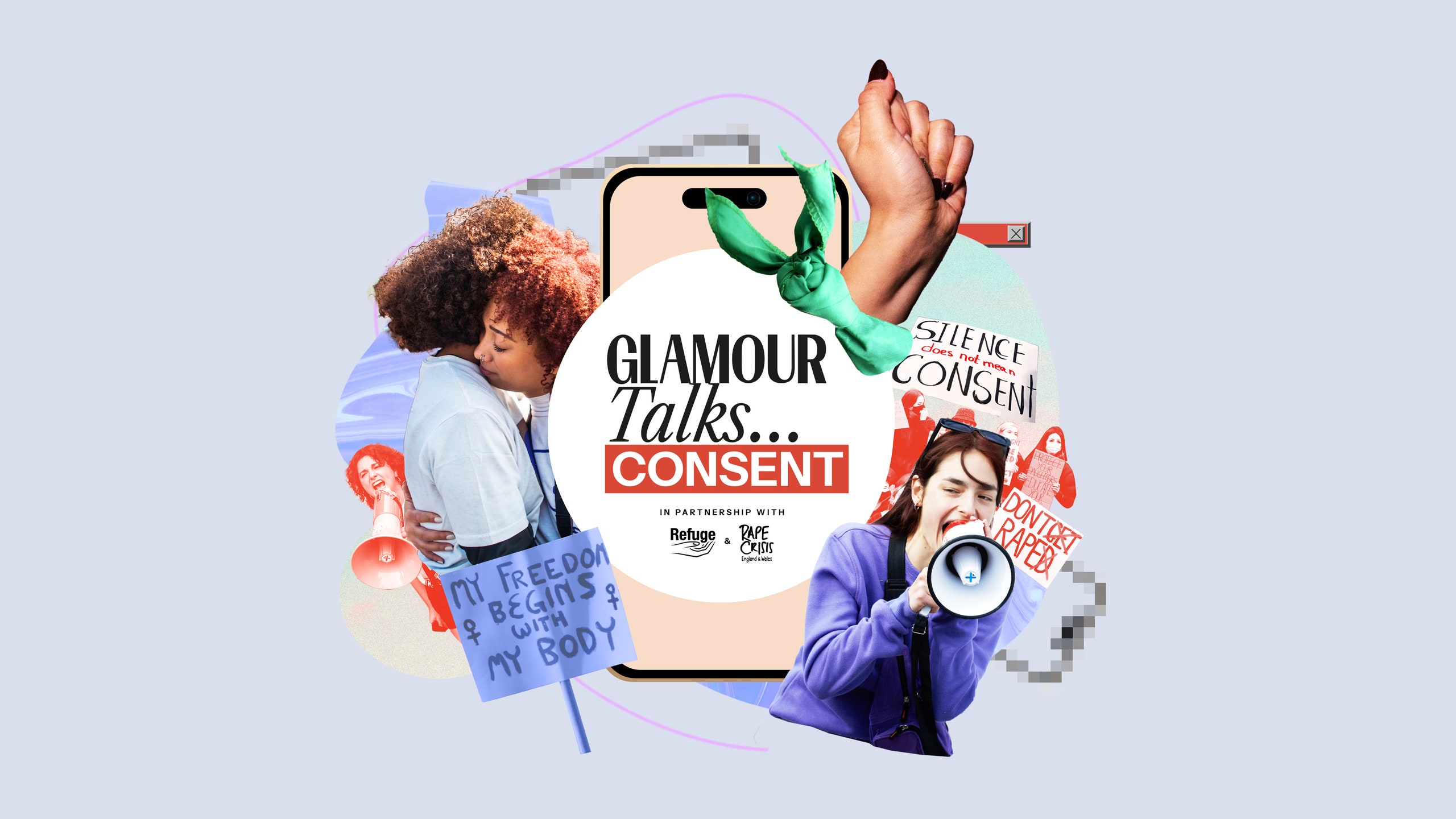This article contains references to rape, online abuse, and sexual violence.
If there's one thing we can all agree on, it's that sexual consent, a person's right to choose whether or not to engage in sexual activity, is at the heart of women's rights.
Here at GLAMOUR, we're proud to be leading the conversation on consent, whether it's our hard-hitting features about deepfake technology, the age of consent, and sex education; honouring Georgia Harrison – who changed the law on digital consent – at our Women of the Year Awards; and launching our groundbreaking consent survey in partnership with Refuge and Rape Crisis, which focuses on you: the GLAMOUR reader.
We asked 3.8k* women for their honest opinions about consent, including whether the legal definition of consent is fit for purpose, the importance of sex education, and whether deepfakes (when computer technology is used to map the faces of celebrities and private citizens onto explicit sexual material) pose a threat to the safety of women.
In the process, we uncovered harrowing statistics about women's experiences of rape and sexual assault:
- 43% reported that they'd been sexually assaulted, with 1 in 4 saying this had happened to them more than once.
- Only 21% of those who have been sexually assaulted felt that they could report the incident to the police.
- 1 in 4 (23%) of the audience told us they have been raped, with 9% of those having experienced it more than once.
- This was higher amongst disabled women, with 39% telling us they have been raped, 23% of those more than once.
We also asked about women's experiences of digital consent, from intimate image-based abuse to sexual assault in the metaverse.
- 40% of GLAMOUR readers told us they feel worried about image-based sexual abuse, or ‘revenge porn’, happening to them.
- Again, this concern was higher amongst disabled women, with 58% of those saying they feel worried about this happening to them.
- 49% of our audience think rape and sexual assault is an issue in virtual reality.
- 91% think deepfaking technology poses a threat to the safety of women.
As a new UK law tackling the creation of explicit deepfakes comes into effect, GLAMOUR explores their ongoing impact.

Read on for all the main findings from GLAMOUR's Consent Survey:
We (mostly) understand the laws on sexual consent…
The overwhelming majority of you (98%) are confident about the definition of sexual consent. When we asked you to describe sexual consent, many of you explicitly referred to the legal definition, emphasising choice as well as having the freedom and capacity to make that choice.
If you need a refresher, here's the legal definition of consent:
In reference to the above legal definition, respondents agreed that the following factors impact a person’s freedom and capacity to consent to sex:
- If they are asleep or unconscious (98%)
- If they have been ‘spiked’ (97%)
- If the other person used physical force against them (97%)
- If they were pressured, bullied, manipulated or scared into saying ‘yes’ (96%)
- If they are too young, e.g. under 16 years of age (89%)
- If they have a mental health disorder or illness that affects their ability to make choices (85%)
- If they have been using drugs or alcohol (79%)
Here's how some of you described sexual consent:
There are many ways to show consent…
When we asked about how sexual consent is best communicated, 31% of you said there is a ‘grey area’. One of you said: "In a safe, loving relationship, your partner would know if you were comfortable or not, but this is unlikely to be the case in a non-safe relationship or more casual encounter”.
Additionally, some highlighted the significance of accessibility in relation to consent cues. As one answer put it, a “grey area exists if you have someone that cannot speak. In their language, i.e. sign language, they can consent. The concern about this is if someone considers this a non-verbal gesture and we link it with smiling, which is not consent”. Another answer pointed to the fact that some neurodivergent people may “not understand or pick up on unclear non-verbal signals”.
- 61% agree that sexual consent can be non-verbal – for instance, gestures like nodding, smiling and eye contact – but only 1% thought this to be the best method of communication.
- 46% think that consent must be verbal, with 43% choosing this as the method they feel best communicates consent.
- 53% told us they feel consent is best communicated both verbally and non-verbally.
- 97% agree that sexual consent can be withdrawn once it has been given, and
- 97% also agreed that someone can be too drunk to give their consent, for example, if they are having difficulty speaking or standing up.
Because consent is the bare minimum.

Our sex education was pitiful…
Only 9% of GLAMOUR readers could recall being taught about sexual consent by the education system in the UK. Of those who do remember being formally educated on sexual consent, just under half (47%) think it properly equipped them to understand what sexual consent is.
Georgia Harrison's trial against Stephen Bear raised our awareness of image-based abuse…
Over half of you were familiar with the Georgia Harrison vs Stephen Bear trial – in which Bear was found guilty of sharing intimate images of Harrison without her consent – in some capacity, with 41% reading about it in passing and 11% actively following the case. 68% of those who were aware of the trial said it increased their awareness of intimate image-based sexual abuse.
- 20% of those aged 18-24 have experienced image-based abuse, and an additional 21% think this may have happened to them.
- Amongst those aged 25-34, 16% had experienced image-based abuse, and an additional 11% think this may have happened to them.
- 10% of those in the 35-44 age group said it has happened to them, with an additional 11% saying they think this may have happened to them.
- Of those who have had intimate images of themselves shared without their consent, 37% said it was an ex-partner who did this to them, 34% said it was a stranger, and 23% said it was a friend.
- 28% of the total audience said they know somebody who has had intimate images of themselves shared without their consent; 14% said they think this may have happened to someone they know.
- 40% told us they feel worried about image-based sexual abuse, or ‘revenge porn’, happening to them; this concern was higher amongst those who consider themselves to have a disability, with 58% of those saying they feel worried about this happening to them.
Deepfaking is a danger to women…
Finally, we asked you about the emergence of deepfake pornography, which is when computer technology is used to map the faces of celebrities and ordinary people onto explicit sexual material.
Only a small number of survey participants have experienced deepfaking, with 2% saying it has happened to them and 6% saying they think this may have happened to them. Of those who have been targeted by deepfaking, the perpetrator was most commonly a stranger (29%).
A further 3% have been threatened with deepfaking, and an additional 5% think this may have happened to them. Of those, the threat was made most commonly by an ex-partner (34%).
Crucially, 91% of you agreed that deepfake technology poses a threat to the safety of women.
*A note on methodology:
In order to ensure we heard a variety of voices, we conducted two separate surveys.
The first survey was sent via a third-party panel provider, where respondents (545 working women aged 18-44) had opted to take part in research studies. If they felt comfortable doing so, respondents shared with us their personal stories surrounding sexual consent. Due to the nature of questions that asked about experiential elements of sexual consent, we felt that using a third-party panel was the best way to create a safe and anonymous space for participants to open up about their personal experiences. The stats based on personal experience of sexual assault and rape are based on this study sample.
A second survey was then sent to our dedicated GLAMOUR research panel and shared on our website and socials, where our audience (3,320 Glamour engagers) told us their perceptions and opinions of sexual consent and the laws in the UK. As with the first survey, all responses remained anonymous, and participants were reassured of their confidentiality throughout. The stats based on perceptions of sexual consent are based on this study sample.
For more information about reporting and recovering from rape and sexual abuse, you can contact Rape Crisis.
If you have been sexually assaulted, you can find your nearest Sexual Assault Referral Centre here. You can also find support at your local GP, voluntary organisations such as Rape Crisis, Women's Aid, and Victim Support, and you can report it to the police (if you choose) here.**
For more information about emotional abuse and domestic violence, you can call The Freephone National Domestic Abuse Helpline, run by Refuge on 0808 2000 247.
The resources and helplines you need to know.

